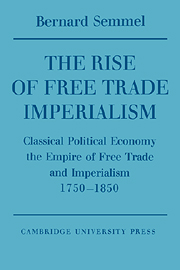 The Rise of Free Trade Imperialism
The Rise of Free Trade Imperialism Book contents
- Frontmatter
- Contents
- Preface
- 1 Introduction
- 2 Theory and politics of Free Trade Empire in the eighteenth century
- 3 The agrarian critique and the emergence of orthodoxy
- 4 The third school: Wakefield and the Radical economists
- 5 The Wakefield program for middle-class empire
- 6 Parliament, political economy, and the Workshop of the World
- 7 Cobdenism and the ‘dismal science’
- 8 Mercantilist revival
- 9 Classical political economy, the Empire of Free Trade, and imperialism
- Selected Bibliography
- Index
3 - The agrarian critique and the emergence of orthodoxy
Published online by Cambridge University Press: 23 October 2009
- Frontmatter
- Contents
- Preface
- 1 Introduction
- 2 Theory and politics of Free Trade Empire in the eighteenth century
- 3 The agrarian critique and the emergence of orthodoxy
- 4 The third school: Wakefield and the Radical economists
- 5 The Wakefield program for middle-class empire
- 6 Parliament, political economy, and the Workshop of the World
- 7 Cobdenism and the ‘dismal science’
- 8 Mercantilist revival
- 9 Classical political economy, the Empire of Free Trade, and imperialism
- Selected Bibliography
- Index
Summary
‘At present I feel a very great difficulty, for I confess I do not very clearly perceive what Mr Malthus' system is,’ wrote Ricardo to McCulloch in May 1820, shortly after the publication of Malthus' Principles of Political Economy, in the course of discussing Malthus' special view ‘on the benefits resulting from foreign trade’. Earlier in this letter, Ricardo observed that ‘I am surprised that rent should be still spoken of as a surplus produce, differing in that respect from the produce of manufactures.’ Ricardo was also unhappy about Malthus' views on the subject of value, and was especially disturbed by Malthus' opinions ‘on the bad effects from too great accumulation of capital and the consequent want of demand for the goods produced’; in a later letter, this time to Malthus himself, Ricardo declared that ‘the great and leading point in which I think you fundamentally wrong is that which Say has attacked in his letters’, i.e., Malthus' rejection of Say's Law asserting the impossibility of general glut. These grounds of difference between Malthus and Ricardo during the early years of the founding of classical political economy are well known. What has been largely forgotten is the answer to Ricardo's initial question. We must try to complete the rediscovery of what was understood by a number of Malthus' contemporaries, especially in France, the ‘system’ upon which most of the doctrines which separated Malthus from classical orthodoxy—his suspicions of foreign trade, his denial of the efficacy of Say's Law, his special view of value and of rent—were based.
- Type
- Chapter
- Information
- The Rise of Free Trade ImperialismClassical Political Economy the Empire of Free Trade and Imperialism 1750–1850, pp. 48 - 75Publisher: Cambridge University PressPrint publication year: 1970


